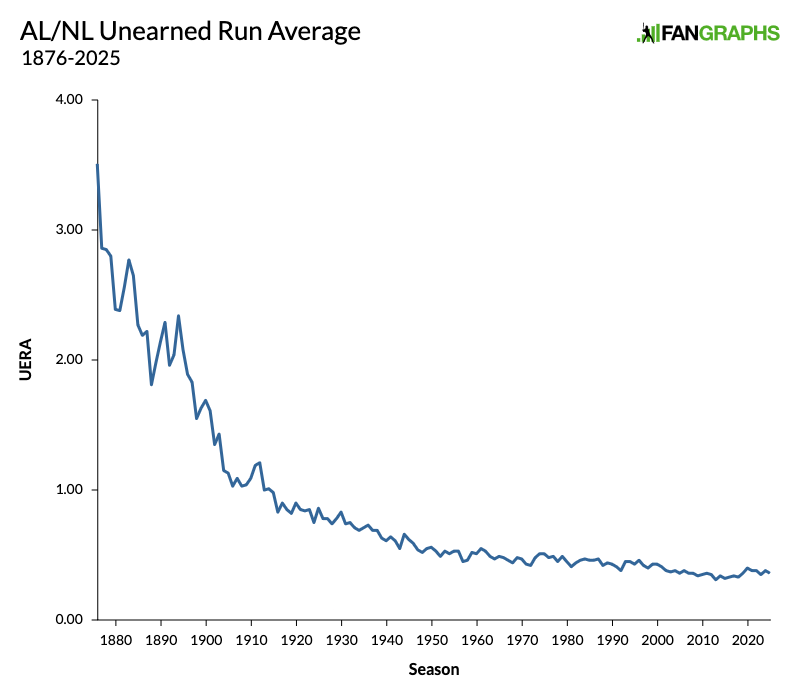The Hard-Luck Losing Pitchers of 2025

This season, four different starters suffered a loss in which they went exactly six innings, struck out exactly six batters, and allowed exactly seven hits, three earned runs, and no unearned runs. Three of them faced the exact same number of batters. But those four pitchers all finished with different pitching lines because they all walked a different number of batters. Our regular season database goes back to 1871, and it contains 241,730 games, each of them unique. In 1927, Bob Smith set a record by facing a whopping 89 batters in a 4-3, 22-inning loss to the Cubs. In 2021, Pablo López became the first starter ever to be charged with a loss after plunking the one and only batter he faced. There may be 50 ways to leave your lover and 5,000 ways to die, but the various ways to lose a baseball game are unconstrained by any such limits.
I could keep on going. In 1959, Harvey Haddix was perfect through 12 innings, then lost the game and the perfecto in the 13th. Five years later, Ken Johnson of the Houston Colt .45s pitched the only complete-game no-hitter in history to end as a loss. I bring up these performances because, watching these playoffs, I can’t help but think about pitchers who earn losses despite pitching brilliantly. Just last night in the NLDS matchup between the Dodgers and Phillies, Jesús Luzardo threw six scoreless innings and retired 17 batters in a row, but he took the loss when two inherited runners scored. Last week, Nick Pivetta took the loss after allowing two runs over five innings to the Cubs, and on the same day, Gavin Williams took a loss for the Guardians because he allowed two unearned runs over six innings.
Today, we’re specifically looking for the pitchers who put up great numbers across all of their losses during the 2025 season. This doesn’t necessarily mean the pitchers who had the worst run support or defense behind them overall. It just means that specifically during the games they went on to lose, they pitched particularly well. Hard luck losses will always happen. As Jacob deGrom can tell you from long experience, any pitcher good enough to hold the other team to a single run will eventually suffer a 1-0 loss. (In fact, all five of the top spots on that particular Stathead search belong to Hall of Famers, with Walter Johnson and Nolan Ryan tied at 63. Amazingly, Johnson, the second-winningest pitcher of all time, also lost 13 games in which he didn’t allow a single earned run, the highest mark ever.) But it takes a confluence of factors to end the season with great numbers across all of your losses.
Just ask Quinn Priester. After years of prospect hype, Preister broke out to the tune of a 3.32 ERA and 13-3 record with the Brewers this season. Although he only lost three games, he ran an ERA of 3.00 in those losses, the best loss-only ERA of any starter with more than one loss. Priester allowed five earned runs over 15 innings in his three losses. He ran a 2.30 FIP, but the Brewers scored a total of two runs in those three games, and errors cost Priester two unearned runs. The Brewers boasted the game’s ninth-best offense and sixth-best defense this season, and they’re on the verge of sweeping the Cubs in the NLDS. That’s just plain bad luck.
Logan Webb turned in arguably the best season of his excellent career, finishing fifth among all pitchers with 5.5 WAR, but he knows a little something about bad luck too. He ran a 3.22 ERA and 2.60 FIP overall, making 2025 his fifth straight season with an ERA below 3.50 and an FIP below 3.20. However, it’s easy to imagine things going even better for Webb. He finished 15-11, and those 26 total decisions put him in a tie for the third-most in baseball. As you’d expect, he got so many decisions because he led all of baseball with 207 innings pitched. Webb ran inverse ERAs, putting up a 2.40 mark in wins and a 4.20 mark in losses, but don’t let that fool you. Across his 11 losses, he put up a 2.97 FIP because he struck out 67 batters and walked just 10. The Giants averaged fewer than two runs per game in his losses and exceeded three runs just three times. Seven times this season, Webb earned either a loss or a no-decision despite surrendering two or fewer runs, and he went at least six innings in six of those seven starts. Had a few more bounces gone Webb’s way, he might have ended up with 20 wins and we might have ended up with a good old fashioned shouting match about whether or not Paul Skenes really deserved the NL Cy Young with a 10-10 record and a 1.97 ERA.
Speaking of Skenes, the presumptive Cy Young certainly wasn’t terrible over the course of his 10 losses; he ran a 4.29 ERA and 4.23 FIP. However, across those 10 losses, the Pirates scored just 11 total runs – 11 runs in 10 games! Somehow, when Skenes left those games, he’d kept the Pirates within two runs of the lead six times. Unfortunately for him, they would only go on to score two total runs after his departures.
Bryan Woo deserves a special mention here. Although he earned his seven losses, running a 4.98 ERA and 5.07 FIP during them, he was the only pitcher in baseball to average more than six innings per start in his losses. Mariners manager Dan Wilson really let Woo work deep, and even more impressive, he didn’t seem to be guilty of just leaving his ace in until he exploded. Woo only coughed up a lead in his final inning in two of those seven losses, and Wilson only pulled him mid-inning once.
We’ll finish with another playoff performer in Tyler Glasnow. Glasnow got into 18 games during the regular season, but across his three losses, he held opposing batters to a miniscule .510 OPS. That was lowest mark of the 199 different pitchers with at least three losses this season, and nearly 100 points below Glasnow’s .607 OPS in wins and no-decisions. He allowed just one home run and ran a WHIP of 0.88 in those three losses, but the Dodgers scored a grand total of just two runs in them.
All the performances I’ve highlighted here are impressive in their own way, but I’ve also checked the historical record, and we didn’t see anything truly spectacular in terms of bad luck this year. If you run a Stathead search for the pitchers with the best loss-only ERAs of all-time, you’ll find 15 different pitchers who lost at least five games in a season while allowing a grand total of zero earned runs, including Cy Young in 1906. Only two pitchers from this century even crack the top 100. The biggest reason for this is that unearned runs have been dropping precipitously since the beginning of baseball history, as you can see from this graph of UERA (that’s unearned run average, for the uninitiated):

In 1900, 31% of all runs were unearned. This year, that number was just below 8%. This is easy to explain. Fielding has improved dramatically over the years, and as Sam Miller has documented, grade inflation has made its way to the official scorer’s desk, making it harder to earn an error than ever before. Knowing this, you might assume that it would be impossible for one of today’s pitchers to put up a historical season in the bad luck department, but that’s not quite true. If we look at the lowest loss-only ERAs after World War II, we see a whole lot of entries from 1968, The Year of the Pitcher™️, but a third of the entries are from the past 25 years, and two of them are from within the past decade. Michael Pineda’s 2014 season is at the very top of the list. Pineda went 5-5 with a 1.89 ERA that season. During those five losses, his ERA was still an astonishing 2.08. Unfortunately for Pineda, the Yankees scored just two runs in those five games!
| Player | Year | ERA | L | UER | OPS |
|---|---|---|---|---|---|
| Michael Pineda | 2014 | 2.08 | 5 | 2 | .568 |
| Bob Gibson | 1968 | 2.14 | 9 | 8 | .580 |
| José Rijo | 1991 | 2.25 | 6 | 3 | .555 |
| Tom Murphy | 1968 | 2.27 | 6 | 3 | .480 |
| Sam McDowell | 1968 | 2.34 | 14 | 19 | .607 |
| Bruce Howard | 1966 | 2.43 | 5 | 2 | .555 |
| Pedro Martínez | 2000 | 2.44 | 6 | 0 | .496 |
| Steve Barber | 1968 | 2.5 | 5 | 10 | .640 |
| Steve Rogers | 1973 | 2.57 | 5 | 2 | .666 |
| Brett Oberholtzer | 2013 | 2.7 | 5 | 3 | .661 |
| Pablo Torrealba | 1977 | 2.7 | 6 | 3 | .653 |
| Jacob deGrom | 2018 | 2.71 | 9 | 3 | .590 |
| John Denny | 1984 | 2.75 | 7 | 4 | .630 |
| Clarke Schmidt | 2024 | 2.77 | 5 | 3 | .626 |
| Dean Chance | 1964 | 2.79 | 9 | 3 | .664 |
| Bobby Shantz | 1957 | 2.86 | 5 | 5 | .688 |
Unsurprisingly, we also see deGrom’s Cy Young 2018 season on the list. He joins Bob Gibson and Pedro Martínez in making the list while winning the award. deGrom went 10-9, and the Mets scored 11 total runs in those nine games. The line I really want you to notice, though, is Clarke Schmidt’s. Schmidt ran a 2.77 ERA over five losses just last year! Schmidt went 5-5 and the Yankees scored 11 runs in his five losses. However, eight of those 11 runs came after Schimdt had left the game! Even less fortunate for Schimdt, the Yankees went on to win in all six of his no-decisions! The Yankees had no problem scoring runs during Schmidt’s starts. They just weren’t inclined to do so while he was actually on the mound and in a position to benefit from them.
All of this is to say that although nobody cracked the list this year, today’s pitchers still have a chance. With the right season-long combination of great pitching, paltry run support, bad defense, and runs from inherited runners, anyone could end up at the top of this dubious Stathead search. They probably wouldn’t consider this good news, though.
Davy Andrews is a Brooklyn-based musician and a writer at FanGraphs. He can be found on Bluesky @davyandrewsdavy.bsky.social.
I knew Pedro had to be on the list, and sure enough, lowest OPS in his losses of all post-1968 pitchers during his ungodly 2000 season. I’m sure 1999 would be on the list too if not for his post-ASB hangover start.
Turns out that the best pitcher in losses is also just the best pitcher, period.